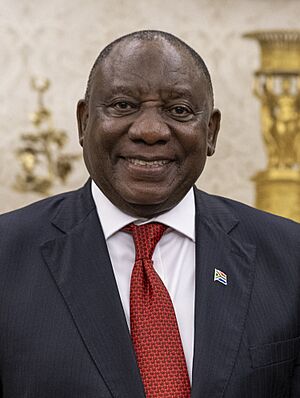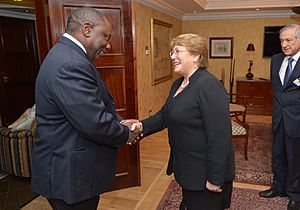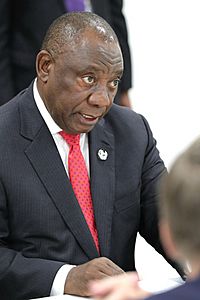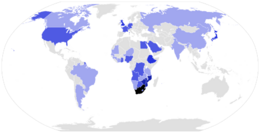Cyril Ramaphosa facts for kids
Quick facts for kids
Cyril Ramaphosa
|
|||||||||||||||||||||||||||||||||
|---|---|---|---|---|---|---|---|---|---|---|---|---|---|---|---|---|---|---|---|---|---|---|---|---|---|---|---|---|---|---|---|---|---|

Ramaphosa in 2025
|
|||||||||||||||||||||||||||||||||
| 5th President of South Africa | |||||||||||||||||||||||||||||||||
| Assumed office 15 February 2018 |
|||||||||||||||||||||||||||||||||
| Deputy |
|
||||||||||||||||||||||||||||||||
| Preceded by | Jacob Zuma | ||||||||||||||||||||||||||||||||
| 14th President of the African National Congress | |||||||||||||||||||||||||||||||||
| Assumed office 18 December 2017 |
|||||||||||||||||||||||||||||||||
| Deputy |
|
||||||||||||||||||||||||||||||||
| Preceded by | Jacob Zuma | ||||||||||||||||||||||||||||||||
| 7th Deputy President of South Africa | |||||||||||||||||||||||||||||||||
| In office 26 May 2014 – 15 February 2018 |
|||||||||||||||||||||||||||||||||
| President | Jacob Zuma | ||||||||||||||||||||||||||||||||
| Preceded by | Kgalema Motlanthe | ||||||||||||||||||||||||||||||||
| Succeeded by | David Mabuza | ||||||||||||||||||||||||||||||||
| 9th Deputy President of the African National Congress | |||||||||||||||||||||||||||||||||
| In office 18 December 2012 – 18 December 2017 |
|||||||||||||||||||||||||||||||||
| President | Jacob Zuma | ||||||||||||||||||||||||||||||||
| Preceded by | Kgalema Motlanthe | ||||||||||||||||||||||||||||||||
| Succeeded by | David Mabuza | ||||||||||||||||||||||||||||||||
| 13th Secretary-General of the African National Congress | |||||||||||||||||||||||||||||||||
| In office 7 July 1991 – December 1996 |
|||||||||||||||||||||||||||||||||
| President | Nelson Mandela | ||||||||||||||||||||||||||||||||
| Preceded by | Alfred Nzo | ||||||||||||||||||||||||||||||||
| Succeeded by |
|
||||||||||||||||||||||||||||||||
| Member of the National Assembly | |||||||||||||||||||||||||||||||||
| In office 9 May 1994 – December 1996 |
|||||||||||||||||||||||||||||||||
|
|||||||||||||||||||||||||||||||||
| Personal details | |||||||||||||||||||||||||||||||||
| Born |
Matamela Cyril Ramaphosa
17 November 1952 Soweto, Union of South Africa |
||||||||||||||||||||||||||||||||
| Political party | African National Congress | ||||||||||||||||||||||||||||||||
| Spouses |
Hope Ramaphosa
(m. 1978; div. 1989)Nomazizi Mtshotshisa
(m. 1991; div. 1993)Tshepo Motsepe
(m. 1996) |
||||||||||||||||||||||||||||||||
| Children | 5 (estimated) | ||||||||||||||||||||||||||||||||
| Alma mater |
|
||||||||||||||||||||||||||||||||
| Occupation |
|
||||||||||||||||||||||||||||||||
Matamela Cyril Ramaphosa (born 17 November 1952) is a South African politician and businessman. He has been serving as the fifth President of South Africa since 2018. Before becoming president, he was an activist who fought against apartheid, a system of racial segregation in South Africa. He was also a leader of a trade union, which is an organization that protects workers' rights. Ramaphosa is also the president of the African National Congress (ANC), a major political party in South Africa.
Ramaphosa became famous as the leader of the National Union of Mineworkers, a powerful trade union for miners. In 1991, he was chosen to be the secretary general of the ANC, working with Nelson Mandela. He played a key role in the talks that ended apartheid. After South Africa's first democratic election in 1994, many thought he would be Mandela's successor.
However, Ramaphosa left politics in 1996 to become a businessman. He was very successful and owned parts of many large companies, including McDonald's South Africa. He returned to politics in 2012 and became the Deputy President of South Africa in 2014, serving under President Jacob Zuma.
In 2017, he was elected president of the ANC. In February 2018, after President Zuma resigned, Ramaphosa was elected president of South Africa. He was re-elected in 2019 and again in June 2024. As president, he has led South Africa's response to the COVID-19 pandemic and served as the chairperson of the African Union.
Contents
Early Life and Education
Cyril Ramaphosa was born in Soweto, Johannesburg, on 17 November 1952. His parents were Erdmuth and Samuel Ramaphosa, who was a retired policeman. He grew up in Soweto and went to Tshilidzi Primary School and Sekano Ntoane High School.
In 1972, he started studying law at the University of the North. At university, he became involved in student politics. He joined groups that were against the apartheid government. Because of his activism, he was arrested in 1974 and held in solitary confinement for eleven months. He was arrested again in 1976 for six months.
After being released, he worked as a law clerk and continued his studies through the University of South Africa. He earned his law degree in 1981.
Fight Against Apartheid
After getting his law degree, Ramaphosa joined the Council of Unions of South Africa (CUSA) as a legal advisor. In 1982, he helped start a new union for mineworkers called the National Union of Mineworkers (NUM). He became its first general secretary.
Under his leadership, the NUM grew from 6,000 members to 300,000. It became one of the most powerful unions in the country. He led the mineworkers in one of the biggest strikes in South African history.
In 1985, the NUM helped form the Congress of South African Trade Unions (COSATU). Ramaphosa became a leading figure in the fight against the apartheid government.
Role in the New South Africa
When the ANC was unbanned in 1990, Ramaphosa became a key leader. He helped organize Nelson Mandela's release from prison. In 1991, he was elected Secretary-General of the ANC. He was the main negotiator for the ANC during the talks to end apartheid.
After the first democratic elections in 1994, Ramaphosa became a Member of Parliament. He was chosen to be the chairperson of the Constitutional Assembly. This group was responsible for writing South Africa's new constitution, which is one of the most respected in the world.
In 1996, he left politics to start a career in business.
Business Career
Ramaphosa became a very successful businessman. He started a company called the Shanduka Group, which invested in many different industries like mining, banking, and telecommunications. He also held leadership positions in major companies like MTN and SABMiller.
In 2011, he bought the rights to run all 145 McDonald's restaurants in South Africa. His business success made him one of the richest people in the country.
Ramaphosa is also interested in cattle farming. He owns a farm in Mpumalanga where he breeds special Ankole cattle, which are known for their long horns.
Return to Politics
In 2012, Ramaphosa returned to politics. He was elected Deputy President of the ANC. In 2014, President Jacob Zuma appointed him as the Deputy President of South Africa.
As Deputy President, he had to sell his business shares to avoid any conflicts of interest. He was also in charge of creating a national minimum wage to help low-paid workers.
2017 ANC Election
In 2017, Ramaphosa ran for president of the ANC. He promised to fight corruption and improve the economy. He won the election on 18 December 2017, becoming the new leader of the party.
Presidency of South Africa

On 15 February 2018, Ramaphosa was elected President of South Africa by the National Assembly after Jacob Zuma resigned. In his first major speech, he promised to grow the economy, create jobs, and fight corruption.
The ANC, led by Ramaphosa, won the general election in May 2019, and he was elected for his first full term as president. He was elected for a second term on 14 June 2024, after the ANC formed a coalition government with other parties.
Domestic Policy
As president, Ramaphosa has focused on important issues like land reform and improving the economy. His government has worked to allow the state to take land without payment to address historical inequalities.
He also launched the Youth Employment Service (YES) to help young people get jobs and work experience. Another key project was the SAFE initiative, which aims to improve toilets and sanitation in the country's poorest schools.
In response to South Africa's energy crisis, his government made it easier for private companies to produce their own electricity. This was done to help reduce power cuts and support economic growth.
Foreign Policy
Ramaphosa has been active in foreign affairs. He has worked to strengthen relationships with other African countries and promote trade across the continent. He supported the African Continental Free Trade Area, which aims to make it easier for African countries to trade with each other.
He has also represented South Africa at global meetings like the BRICS summit and the G7 summit. In 2022, he made a state visit to the United Kingdom and met with King Charles III.
During the Russian invasion of Ukraine, Ramaphosa and other African leaders tried to act as peacemakers. They visited both Russia and Ukraine to present a peace plan.
Ramaphosa was praised internationally for his leadership during the COVID-19 pandemic. His government took quick action to slow the spread of the virus, including implementing a strict lockdown. He was seen as a calm and compassionate leader during the crisis.
Personal Life
Ramaphosa has been married three times. He is currently married to Dr. Tshepo Motsepe, who is a medical doctor and the sister of billionaire Patrice Motsepe. He is thought to have five children.
He is a polyglot, meaning he can speak many languages. He often uses different South African languages in his speeches to connect with people from all backgrounds.
In 2018, he announced that he would donate half of his presidential salary to charity. The money is managed by the Nelson Mandela Foundation to help build the nation.
Images for kids
-
Ramaphosa at the Global Open Government Summit in Mexico City, 28 October 2015
-
Ramaphosa alongside UK Prime Minister Boris Johnson at the 47th G7 summit, 12 June 2021
-
Ramaphosa with U.S. President Joe Biden in the White House, 16 September 2022
-
Ramaphosa and other BRICS leaders during the 15th BRICS summit in Johannesburg, August 2023.
-
Ramaphosa with U.S. President Donald Trump in the White House, 21 May 2025
See also
 In Spanish: Cyril Ramaphosa para niños
In Spanish: Cyril Ramaphosa para niños









